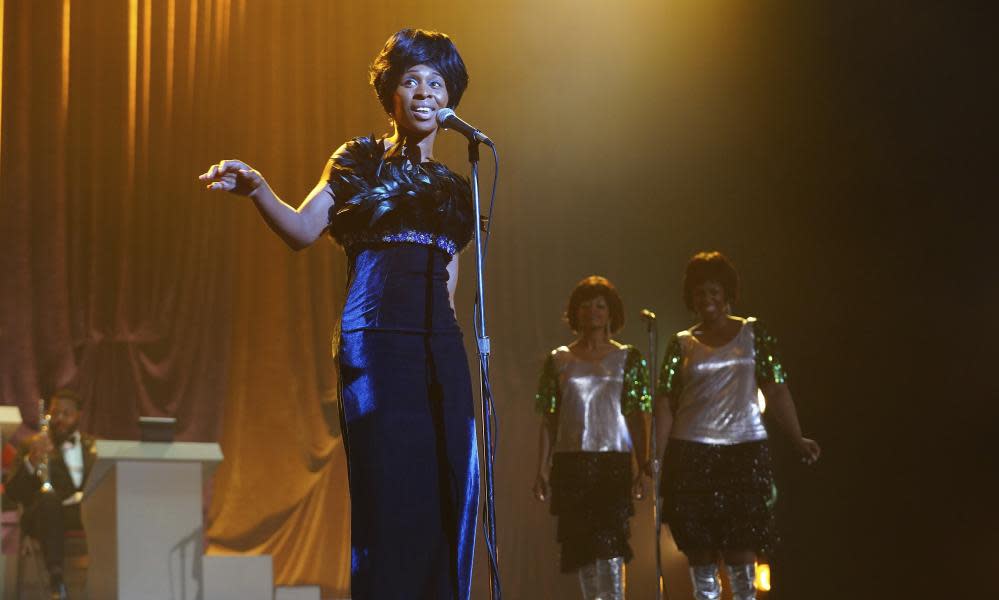Genius: Aretha review – clunky Franklin biopic needs more respect

- Oops!Something went wrong.Please try again later.
- Oops!Something went wrong.Please try again later.
The first season of National Geographic’s anthology series Genius centered around Albert Einstein. The second, Pablo Picasso. For the most part, these past iterations were formulaic melodramas anchored by magnetic leads (Geoffrey Rush and Antonio Banderas, respectively). The newest Aretha Franklin installment, starring Cynthia Erivo, isn’t terribly different in this regard. It’s essentially a soap opera masquerading as something vaguely more sophisticated due to the import of its subject and the pedigree of its cast. But it’s not a particularly good soap opera either, suffocated as it is by clunky, oversimplified attempts to capture the complexities of Franklin’s life and character. Its failures, given the singer’s recent death in 2018 and criticisms lodged against the show by members of her family, therefore feel particularly vexing.
Related: 'A legend in her own right': Carolyn Franklin, Aretha's forgotten sister
From beginning to end of the eight-part series, we’re thrown back and forth between Franklin’s childhood and the pivotal early years of her career between 1967 and the late 70s. The conceit is meant to show us how the singer’s relatively privileged, but still deeply traumatic childhood informed the way she would navigate her exploding fame. Fair enough, but these threads never exactly come together the way they should, and with so many clumsily handled moving parts any sense of urgency and tension feels muted and insincere.
“I’m a princess in a fairytale,” the older Aretha tells her publicist, referring to how she wants to be perceived by her fans. She’s not completely inventing things: in the first episode, we see her wealthy preacher father, CL Franklin (Courtney B Vance), ward off a pair of backroad racists by nonchalantly gifting them the keys to his luxury car, then strolling off to buy a new one. CL recognizes young Aretha’s (Shaian Jordan) talents early on, and ensures there’s nothing stopping her from achieving what he sees as her destiny (not even unplanned pregnancies at the ripe age of 12). Yet Aretha resents her father, a chronic boozer and philanderer, and blames him for (among other woes) the death of her beloved mother.
As a rising star striving to shape her identity as an artist, we see Franklin contend with white producers and the abuses of a tyrannical first husband; lend her celebrity to the civil rights movement; engage in petty spats with her father and her many siblings; and eventually elbow her way into a position of control over her own career. The show’s high production value ensures some beautifully vivid recreations of the period, with Franklin’s styling and costume design a particular standout (though I sometimes found myself, bored by the actual story, drifting off into lolling admiration of the singer’s billowing goddess-like gowns, her chic headscarves and peacock-colored turtlenecks).
Like many musical biopics, we get a closer look at where the magic happens with peeks into Franklin’s recording sessions. Raw renderings of the songstress’s greatest hits are seen at their points of conception, then later played out on stage at concerts, rallies or church services. These are inevitably the show’s most arresting moments, and thankfully they happen quite frequently, and with all the pomp and ceremony befitting the Queen of Soul. Yet these stirring musical interludes also amplify the show’s inadequacies in other respects.
Erivo (a gifted vocalist and the Oscar-nominated star of Harriet) is a glowing musical performer, and she brings out the swaggering sensuality of Franklin’s artistry. But with a script that literally feels like nails on a chalkboard, her performance otherwise falters. “Mass incarceration and racial injustice makes me want to holler!” she says at the beginning of an episode dedicated to her political awakening. “I’m going to record a protest album. It’s time to take a stand!” That’s just a sampling of the grating dialogue these actors are forced to deliver (and here in particular, elements like Franklin’s commitment to social activism feel awkwardly shoehorned in). Somewhere behind the fog of the show’s convoluted narrative strategy, Franklin comes off as a brooding alpha female, arrogant and fiercely independent. Yet Erivo whispers her lines; in attempting to convey steely restraint, her face instead looks blank and empty.
I mostly blame the writers, who resort to cliches and shallow psychologizing to create the illusion of depth in their characters. Even our heroine at times feels only like the sum of her daddy issues. Genius: Aretha gets credit for humanizing Franklin – it’s no simple paean, but rather a portrait of a genius drawn in shades of grey. But for my money, I’ll place my bets on the movie version coming out later this year.
Genius: Aretha starts on National Geographic on 21 March with a UK date to be announced

